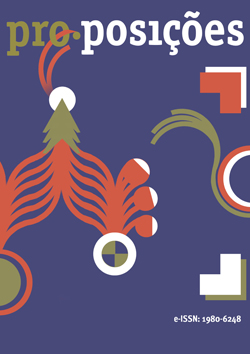Abstract
The objective of this article is to investigate how sociability networks are built from school experience, and the importance of school as a device for social ascension. To that end, we identify the relationship strategies developed by Oswald de Andrade and Menotti del Picchia, two of the fundamental authors of São Paulo’s modernism, in the establishment of their sociability networks based on the analysis of their school trajectories and family relations, as pointed out by their autobiographies. From the concepts of Sirinelli, we investigated the ways in which the authors perceived their own school experience as, a catalyst for the networking that enabled their social ascension, in the case of Menotti, a son of humble immigrants, or manifestly a space of maintenance of power in Oswald’s case who was from a rich and influential family. The analysis of the school paths shows how each one acted before their meeting in the modernist movement and allows to understand how their behaviors and practices, had weight in the social and political choices made by both, from their social places and other formative experiences, revealing strategies, pressures and relations of political and religious strength in the search for conquering their own spaces, especially with the advent of the Modern Art Week.
References
Andrade, O. (1976). Um homem sem profissão Rio de Janeiro: Civilização Brasileira.
Boaventura, M. E. (1995). O salão e a selva: uma biografia ilustrada de Oswald de Andrade Campinas: Editora Unicamp.
Bourdieu, P. (1996) As regras da arte:gênese e estrutura do campo literário São Paulo: Companhia das Letras.
Fonseca, M. A. (2007). Oswald de Andrade: biografia São Paulo: Globo.
Hébrard, J. (2001). O autodidatismo exemplar: como Valentin Jamerey-Duval aprendeu a ler? In R. Chartier (Org.), Práticas da leitura (pp. 35-73). São Paulo: Estação Liberdade.
Martins, W. (2002). A idéia modernista Rio de Janeiro: Topbooks.
Miceli, S. (2001). Intelectuais à brasileira São Paulo: Companhia das Letras.
Picchia, M. (1959). O árbitro São Paulo: Livraria Martins Editora.
Picchia, M. (1970). A longa viagem São Paulo: Livraria Martins Editora.
Prado, A. A. (2010) Itinerário de uma falsa vanguarda:os dissidentes, a Semana de 22 e o Integralismo São Paulo: Editora 34.
Sevcenko, N. (1992). Orfeu extático na metrópole:São Paulo, sociedade e cultura nos frementes anos 20 São Paulo: Companhia das Letras.
Sirinelli, J.-F. (2003). Os intelectuais. In R. Rémond (Org.), Por uma história política (2a ed., pp. 231-269). Rio de Janeiro: FGV.

This work is licensed under a Creative Commons Attribution 4.0 International License.
Copyright (c) 2021 Vanessa Konopczyk Amaral Ribeiro


